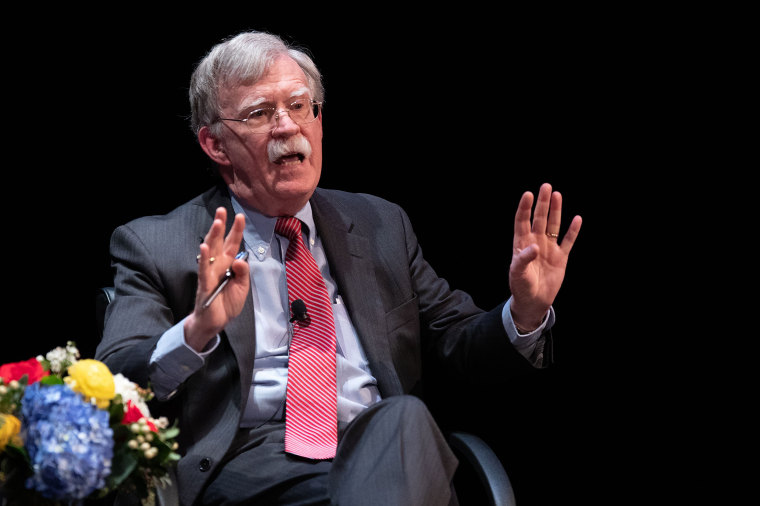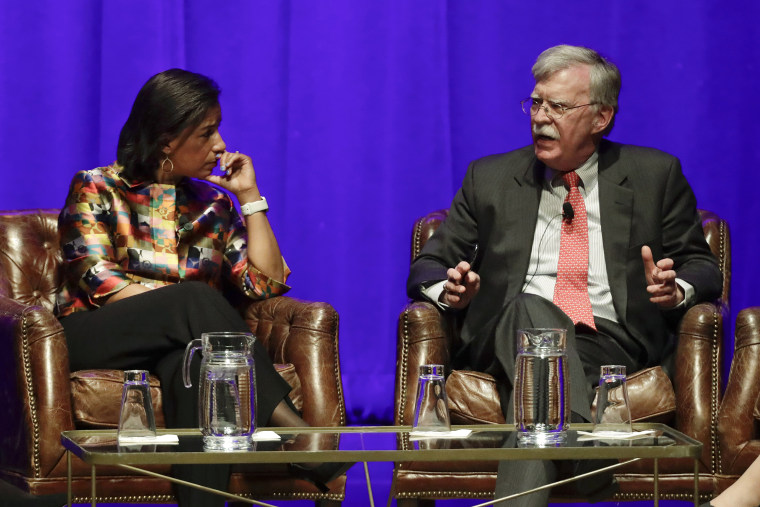NASHVILLE, Tenn. — Former national security adviser John Bolton said Wednesday he was surprised that Senate Republicans rejected his offer to testify in President Donald Trump's impeachment trial. But he said that even if he had testified, it wouldn't have changed the outcome of the trial because of how House Democrats handled their investigation.
"I think the House committed impeachment malpractice," Bolton said at an event at Vanderbilt University with Susan Rice, who was national security adviser during the administration of former President Barack Obama. "The process drove Republicans who might have voted for impeachment away" because "it was so partisan," he said.
But, he added, "my testimony would have made no difference to the ultimate outcome."

All but one Senate Republican voted to acquit Trump of abusing the power of his office by pressuring Ukraine to investigate a political opponent.
Rice challenged Bolton repeatedly over his decision not to testify in the House or publicly discuss what he knows about the president's Ukraine pressure campaign, particularly as officials who worked for him on the National Security Council have done so and have since endured Trump's wrath.
"I can't imagine withholding my testimony, with or without a subpoena," Rice said. "I also can't imagine, frankly, in the absence of being able to provide the information directly to Congress, not having exercised my First Amendment right to speak publicly at a time when my testimony or my experience would be relevant. And, frankly, when my subordinates ... were doing their duty and responding in a fashion consistent with their legal obligations to provide information."
Rice specifically mentioned two former National Security Council officials, Army Lt. Col. Alexander Vindman and Fiona Hill. Both have been targets of criticism from the president and his allies, and Vindman was pushed out of the National Security Council shortly after the Senate impeachment trial ended.
"That, for me, makes it even more difficult, as a former national security adviser, for me to imagine not being willing to come forward," Rice said. "I would feel like I was shamefully violating the oath that I took to support and defend the Constitution."
Bolton noted that he offered to testify in the Senate trial and that the House didn't subpoena him after Democrats learned that he would seek a court ruling because the White House had told him not to testify.
He wouldn't speculate about testifying before the House now if he is subpoenaed, because, he said, his lawyer has advised him not to take a position during a national security review by the White House of his book on his time as national security adviser.
Download the NBC News app for breaking news and politics
Bolton also tried to deflect growing criticism that he isn't speaking out because he's simply out to sell his book about his 17 months in the Trump White House. He said he couldn't speak out now because his book — "The Room Where it Happened"— is still undergoing a prepublication national security review and he believes Trump would have his administration sue him if he discussed its contents before that's complete.
"I'm not out here flacking for it," he said. "I believe I wrote a book that does not contain any classified information. The staff reviewing it says it does.
"But for all those who say that I should just spill my guts here or anywhere else, make no mistake," he continued, "in the back of the position that there's classified information in the manuscript is the implied threat of criminal prosecution."
Rice pressed Bolton on the issue, noting that he had repeatedly teased the book's apparently salacious contents and that he said this week that the Ukraine chapter is just "the sprinkles on the ice cream sundae."
Bolton said he has been following the advice of his lawyer, Charles Cooper, and hopes to have his book published at some point.
In their testimony to the House, Hill, who oversaw Russia policy, and Vindman, who was the Ukraine expert, detailed actions Bolton took amid the White House's Ukraine pressure campaign. Hill testified that Bolton told her to take her concerns to the White House counsel's office and convey that he was "not part of whatever drug deal" was being cooked up by the president's personal lawyer Rudy Giuliani and Gordon Sondland, then the U.S. ambassador to the European Union.
Bolton left the White House in September on contentious terms with Trump. Wednesday marked his second public appearance this week. In remarks on Monday, he called the White House's handling of his book "censorship." His book is scheduled to publish March 17, but it seems increasingly unlikely that the national security review will be completed in time.
Long a fixture in the Republican Party, Bolton has become a target of criticism from Trump and his supporters after he said he was willing to testify in the Senate trial and made it clear that his book includes details potentially damaging to Trump.
He had a warning for his fellow Republicans, however, on Russia. He said there is no doubt that Moscow interfered in the 2016 election and that he hopes the GOP doesn't forget the threat that Russia and President Vladimir Putin pose.
Bolton has criticized Trump's policies on Iran and North Korea. On Wednesday, he called Trump's strike in Syria in 2017 "utterly inadequate," because it didn't deter Syrian President Bashar al-Assad from using chemical weapons again. And he said the controversial decision to invite the Taliban to the presidential retreat at Camp David, Maryland, last year was solely Trump's. The meeting, which was scheduled for Sept. 11, was eventually canceled.
"There was only one person that I know of in the history of the United States government that's ever favored bringing the Taliban to Camp David," Bolton said.
He also delivered broader criticism of Trump's approach to national security issues.
"I'm not aware in the Trump administration of any of the senior national security advisers who were ever shy about expressing their opinion. The only question is whether it ever mattered," he said.
And at another point, he said: "You cannot have a consistent policy that only lasts for a day or two before it changes. You cannot do that."

